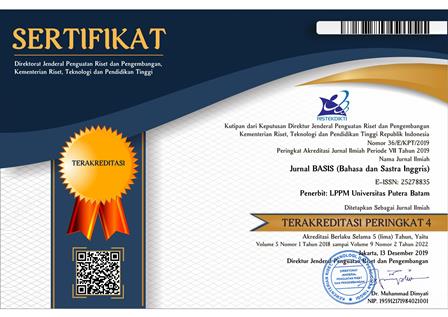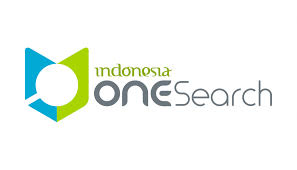PEMEROLEHAN SEMANTIK BAHASA MINANGKABAU ANAK USIA TIGA TAHUN ENAM BULAN
Kata Kunci:
language acquisition, semantics, the age of three years and six monthsAbstrak
This article describes the semantics of language acquisition Minangkabau children aged three years and six months. The aim of the research is to describe the process of acquirement of Minang Language by three and six months (3.5) years old children semantically. The type of the reseacrh is qualitative research by using descriptive method. The research concludes some of the following. (1) child in the preoperational already widely used class of words in conversation or language; (2) children who are at the stage of semantic field use more nouns in ujarannya words of another word class; (3) children aged three years not only say a few classes of verbs, adjectives, nouns, pronouns, numeralia, and said duty in preposition in language ujarannya, but children also understand what he is saying; (4) in the pronunciation of the letter (s) the children can not pronounce correctly. Based on the research it is found excessive generalizing the class of a particular word. The word that tends to generalize excessively by the respondent is a word that is far from the environment and the word which has similar features. In addition, the three classes of words (verbs word class, said class of nouns and adjectives word classes) of respondents also gained other words namely numeralia class and soon. Based on data analysis and discussion that has been done in this study, respondents may otherwise be known at the time of sweeping generalization. Specifically, this research deals with the verbal speech acts of the children which is based on the data analysis and discussion that show the acquirement of Minang Language of denotative meaning lexically can be divided into 1) nominal, 2) Verbal, and 3) adjective.
Referensi
Chaer, Abdul. (2009). Pengantar Semantik (Edisi Revisi). Jakarta: Rineka Cipta.
Chaer, Abdul. (2002). Psikolinguistik Kajian Teoretik. Jakarta: Rineka Cipta.
Djajasudarman, T. Fatimah. (2012). Semantik 1:Makna Leksikal dan Gramtikal. Bandung: Eresco.
Ibnu, Suhadi dan dkk. (2003). Dasar-dasar Metodologi Penelitian. Malang: Universitas Negeri Malang dan Lembaga Penelitian Universitas Negeri Malang.
Maksan, Marjusman. (1995). ”Psikolinguistik”. Padang: IKIP Padang Press.
Manaf, Ngusman Abdul. (2008). Semantik: teori dan terapannnya dalam bahasa Indonesia. Padang: Sukabina Offset.
Moleong, Lexy. J. (2000). Metodologi Penelitian Kualitatif. Bandung: Remaja Rosda Karya Offset.
Pateda. Mansoer. (2001). Kosakata dan Pengajarannya. Flores: Nusa Indah.
Putri, dkk. ”Pemerolehan Bahasa Indonesia pada Anak Usia Dini Di Desa Beraban Kec Kediri Kab Tabanan. Jurnal (Online),( http://pasca.undiksha.ac.id/e-journal/index.php/jurnal_bahasa/article/viewFile/1436/1109. Diunduh tanggal 29 April 2016.
Rofi’uddin, Ahmad. (2003). Rancangan Penelitian Pengajaran Bahasa Indonesia. Malang: FS. UNM.
Rusyani, Endang. 2008. ”Pemerolehan Bahasa Indonesia Anak Usia 2,5 Tahun. Jurnal Direktori UPI (Online).(http://file.upi.edu/Direktori/FIP/JUR._PEND._LUAR_BIASA/195705101985031ENDANG_RUSYANI/Pemerolehan_Bahasa_AUD.pdf). Diunduh tanggal 29 April 2016.
##submission.downloads##
Diterbitkan
Terbitan
Bagian
Lisensi

















